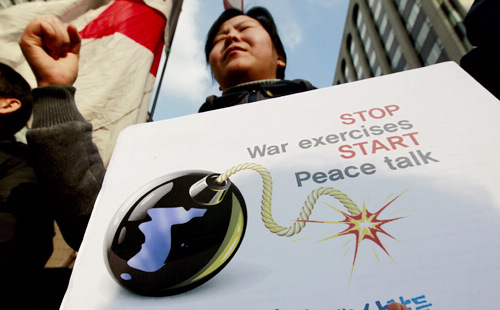|
 |
|
CALLS FOR PEACE: A protester demonstrates against U.S.-South Korean joint military exercises in Seoul on March 3 (CFP) |
When Kim Jong Un came to power in Pyongyang last year, Western countries were anxious about the future of North Korea under the new leadership. But they can now feel a bit more relaxed as analysts say Pyongyang will continue to seek improvements in its relations with the West, as evidenced by the breakthrough made at a recent meeting between North Korea and the United States.
The meeting, held in Beijing in late February, was the first of its kind since Kim Jong Un took over the reins. Under the agreement reached at the meeting, North Korea will suspend its nuclear tests, long-range missile launches and uranium enrichment activities, and allow the International Atomic Energy Agency to monitor the moratorium on uranium enrichment. In return, the United States will provide food aid to North Korea, with an initial package of 240,000 tons of nutritious food.
The latest agreement between North Korea and the United States showed North Korea's new leader intends to implement more open policies, said Shi Yongming, a research fellow on Asia-Pacific studies with the China Institute of International Studies.
"Though bilateral talks between Washington and Pyongyang on the nuclear issue began last year when late North Korean leader Kim Jong Il ran the country, Kim Jong Un chose to continue what is good, revealing a sunny picture," Shi said.
Moreover, domestic economic policy adjustments carried out by the new leader will provide possibilities for greater openness in North Korea, he said.
North Korea's official news agency recently reported that Pyongyang has amended its laws to attract more outside investment for economic development.
Given Pyongyang's commitment to building a prosperous country, it needs a peaceful regional environment, which might be another reason for the recent agreement between North Korea and the United States, Shi said.
"The agreement accords with their different needs," he said. "For Pyongyang, besides the food aid, it wants the talks to be continued. In the meantime, the United States now focuses its attention on Iran and Syria. In an election year, the immediate goal of Washington is that Pyongyang doesn't cause any trouble."
Zhan Debin, a researcher of Korean studies with the Shanghai Institute of Foreign Trade, said the deal could help Kim Jong Un reinforce his domestic political position. For Kim Jong Un, who took office only a few months ago, the most urgent issue is to ensure adequate food for the people. North Korea most often needs food assistance in spring, Zhan said.
The U.S.-North Korean deal was welcomed by parties concerned. U.S. Secretary of State Hillary Clinton described Pyongyang's move as a "modest first step in the right direction" at a Senate hearing on February 29, the day the deal was announced.
Some observers say the deal between Washington and Pyongyang might eventually lead to the resumption of the six-party talks, a framework involving North Korea, the United States, China, South Korea, Japan and Russia aiming at ending North Korea's nuclear program through a negotiating process.
Chinese Foreign Ministry spokesman Hong Lei said on March 1 China is willing to strive with all other concerned parties to continue advancing the six-party talks process.
| 